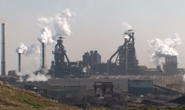Market Segment

December 13, 2019
Steel Mill Pollution Settlements Mount
Written by Sandy Williams
Environmental damage and health issues have been a recurring theme in coverage of U.S. steel mills in the past few years. The issues, whether stemming from aging equipment or unanticipated accidents, are costing steel companies millions in repairs, penalties and lost production.
U.S. Steel agreed on Dec. 4 to an $8.5 million tentative settlement in a 2017 class action lawsuit regarding air pollution from its Clairton Coke Works. Residents near the coke plant alleged that due to negligence by U.S. Steel, odors and pollution from the coke works impacted resident quality of life.
The settlement includes a $2 million payout, minus about $925,000 in attorney fees, to approximately 5,600 households in the area.
U.S. Steel is also required, within one year, to invest $6.5 million in equipment upgrades at Clairton to address air emissions. According to court documents, upgrades will include the installation of mass air coolers at the pushing emission control baghouses as well as battery machinery and refractory improvements.
Earlier this year, U.S. Steel and the Allegheny County Health Department announced a $2.7 million settlement over 2018-2019 emissions violations at Clairton. Ninety percent of the settlement will be allocated to a Community Benefit Trust with the remainder deposited to the Allegheny County Clean Air Fund.
U.S. Steel reportedly has received several emissions violations over the years for air quality issues at Clairton, but water violations are also a problem for mills that are located near to river access. A flooding incident on Nov. 7 at Gary Works released mercury into the Grand Calumet River. The company’s Minntac taconite mine was recently denied renewal of a pollution permit due to leaking of sulfates from the mine’s tailings basin into groundwater. In October, the U.S. Steel Midwest Plant in Portage, Ind., released excess amounts of the carcinogen hexavalent chromium into the Burns Waterway causing a temporary shutdown of the plant. In April 2017, the same plant spilled 900 pounds of the chemical into the Burns Waterway and Lake Michigan that resulted in a $1.2 million settlement.
ArcelorMittal
ArcelorMittal has had their share of problems, as well. In August 2019, cyanide and ammonia from the Burns Harbor mill spilled into the Little Calumet River that flows into Lake Michigan. The spill reportedly killed more than 3,000 fish and closed beaches along Lake Michigan and Indiana Dunes, as well as impacting drinking water in the region. Burns Harbor has received more than 100 violations under the Clean Water Act since 2015. The company is currently subject to a lawsuit by the Environmental Law & Policy Center and Hoosier Environmental Council.
ArcelorMittal’s coke works in Monnessen, Pa., paid a $1.5 million penalty for air pollution violations in 2017 and was ordered to implement $2 million in pollution controls to limit particulate and sulfur emissions.
None of these violations are intentional, but they cause damage to the environment and threaten the health of citizens in the affected areas. Costs for steel companies are in the millions due to fines, loss of production and repairs.
ArcelorMittal, on its website, sums up the impact that the steel industry has on the environment:
“Our sector depends heavily on natural resources. Mining sites have an impact on extensive areas of land, which later need restoration. Steelmaking and mining create a range of air emissions, including dust, NOx, and SOx – in particular older steel mills, where urbanization has developed around them, have often had a poor reputation for air quality.
“Steelmaking also requires large volumes of water – although strategic locations, water re-use and high levels of treatment within the processes all mean its net impact is usually relatively small. Our steel and mining operations may also affect noise and vibration, wastewater and soil protection. Where we don’t get these impacts right, our business faces disruptions, and the risk of pollution fines or reputational damage is likely to increase.”







